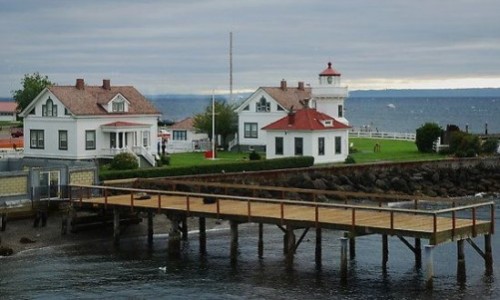By Margaret Robe Summitt, Mukilteo Historical Society
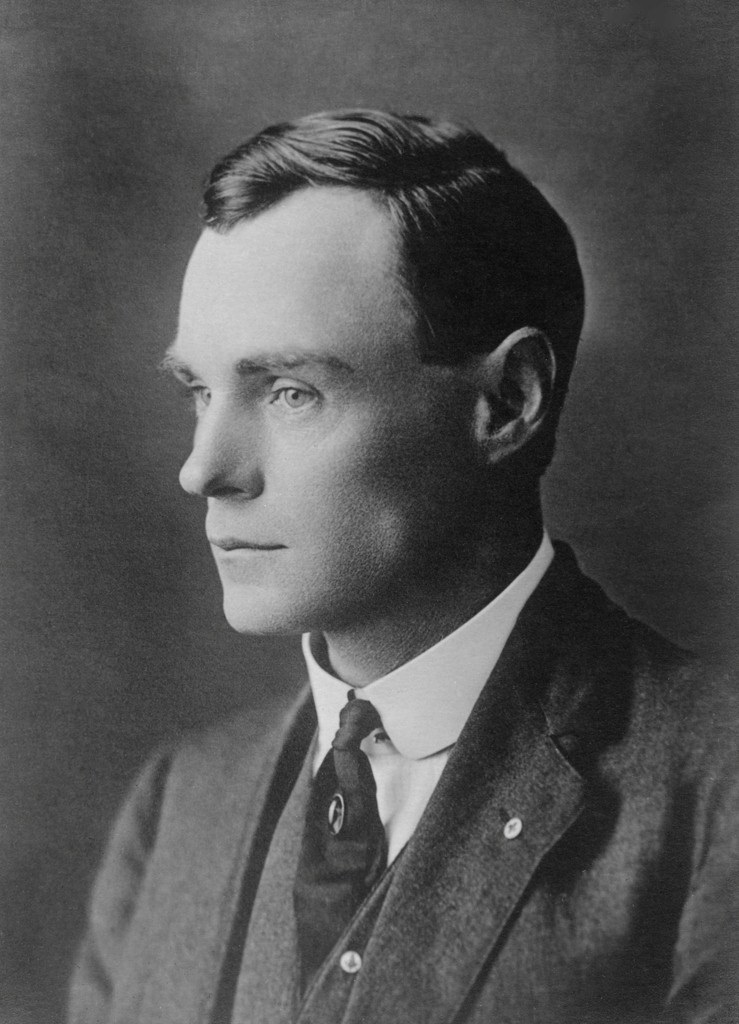
Chart Pitt was a Mukilteo original. In his heyday, the 1920s to 1940s, some might have called him ornery and a crank. To say he was colorful would be disrespectful to the rainbow. Chart Pitt was an adventurist, a pulp fiction writer, a passionate legislator, full of antics on the Washington State House floor.
His energy flowed into creative words and speeches, inspired by long hours spent watching the seas and observing men at work. “I am a product of the Wisconsin woods,” he wrote. “Been a hunter and trapper all my life—began on rats. Of late it’s editors I’m baiting.” He hunted and fished in Alaska, where he “hunted gold and had the pleasure of not finding it.”
So far I have been unable to find Chart Pitt in the 1910 Census, but that’s not surprising, considering that he was at the time a young man in search of adventure. He may have been living on a remote island, maybe in Alaska as a lighthouse keeper, or in tropical seas outside the U. S.
Chart Pitt was born Chartley Artel Pitt April 17, 1878 in Portage County, Wisconsin, to William C. Pitt (b. 1847 NY) and Jane “Jennie” (Eaton) Pitt (b. 1850 Canada). At age 22 he was residing on his father’s farm (1900 Census, Eau Pleine, Portage, WI).
Pitt struck out for the west as a young man. He made Bellingham his home but he wandered far and near, sometimes riding the rails with hoboes in boxcars. The hobo, he mused, is a character impossible to capture in fiction. The spirit of the hobo, to Pitt, was a spirit of brotherhood and anonymous charity. To illustrate, he related in his brief autobiography a time when he was sleeping with hoboes in a boxcar in the Northern Pacific rail yards in Pasco. They were awakened by shouts of “Fire!” The town of Pasco was ablaze and the rail yard was threatened. The hoboes then seized fire hoses in the yard and did their best to put it out. When he arrived home in Bellingham, Pitt saw that one of the Seattle papers had blamed the hoboes for starting the fire for the purpose of looting the town. This was ever the attitude of the media toward hoboes, Pitt said.
He married (18 Aug 1909, in New Westminster, B. C.) Emma May “May” McLeod, b. 1886 in North Dakota, daughter of Captain Neil S. McLeod, a master mariner of Bellingham. The McLeod family was living in Bellingham by 1890. At the time of his marriage at age 32 Chart Pitt was a resident of Joseph, Idaho. His parents were listed as living there in the 1910 Census—at least his mother Jennie was, but her husband William’s information was crossed out by the census taker and her marital status was listed as “widowed.” The year 1910 was notable in Pitt’s literary career for two reasons. In that year he won a prize of $10 for “The Watcher,” the best poem about Mother’s Day, offered by the Modern Woodmen of America fraternal organization, which pronounced Pitt a “real poet,” a feat duly recorded in his hometown newspaper, the Stevens Point Gazette. In 1910 he also published a poem, “Back to the Night,” in Liberty, a Seventh-Day Adventist magazine, beginning a long association with that sect that culminated with his baptism in May 1959.
Daughter Lotus Pitt Pasternack was born July 6, 1912 in Bellingham. At the time, her father was employed by the U. S. Lighthouse Service. Her first four years were spent south of Ketchikan at Tree Point Lighthouse, where Chart Pitt was Second Assistant Keeper from 1911, and where locals called her “Lavender Lotus, Lilly of the North.” The family later moved to Ediz Hook Lighthouse, Destruction Island Lighthouse and finally to the Mukilteo Lighthouse. He was lighthouse keeper at Mukilteo from 1917 to 1922. In the 1920 Census he was living with his family in Mukilteo, married with wife May and small children: daughter Lotus age 7, sons Donald age 4 and Gordon age 2; these children were born in Washington. Of his time at lighthouses Chart Pitt wrote of “sitting alone thru the night-watches, keeping the beacon burning, that those who go down to the sea in ships, may return again. It’s the thunder of surf—and the flying spray—and the gauzy things they make dreams of, that hold me there.”
Chart Pitt’s niece, the late Elaine Scheib Jensen, was Mukilteo Pioneer of the Year for 2011. The Scheibs used to live diagonally across from her best friend Sylvia “Tude” (Zahler) Richter’s house on Fifth Street. Elaine recalled that Chart Pitt drove her and Tude to a hotel in Edmonds the night of the Powder Mill Gulch explosion in 1930. It was the first time either had spent a night in a hotel, but Tude was disappointed because they did not get the ice cream they were expecting that night. Tude told me that at age 12, she and Elaine used to go around Mukilteo delivering radical newspapers for Mr. Pitt.
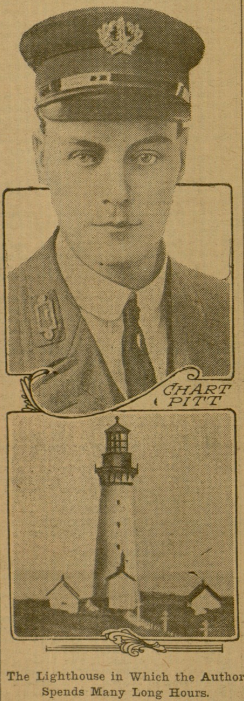
Starting about 1909, Pitt frequently submitted verses and fiction to popular magazines. His short stories appeared in such pulp magazines as Thrilling Adventures, Action Stories, North-West Stories, Outdoor Stories, and Red-Blooded Stories. They often dealt with seafaring, hunting, mining, and man against nature generally. If the Everett Public Library had started back in the 1970s collecting Pitt’s fiction, there would be a whole shelf of it now in the library, librarian David Dilgard told me.
“The Bootlegger’s Brat” (1931) is set in Oregon, but those in the know recognized it as a thinly disguised portrait of Mukilteo during Prohibition days. David Dilgard told me that this book is like H. P. Lovecraft’s “Necronomicon”—in that some people claim to have seen a copy but no one knows where to actually find one. It was published in 1931 under the imprint of Hurst and Blackett in London. Pitt’s fiction had been, and still remains, better known in England than over here. The only review (unsigned) to be found online appeared in the Sydney, Australia Morning Herald for April 3, 1931.
“Among the Rum-Runners of Oregon”: “The purpose of Mr. Chart Pitt in writing ‘The Bootlegger’s Brat’ may have been to supply ‘wet’ propaganda, or to show the ease with which lawless practices are carried on in the United States. Apart from this, his story is a vigorous if undistinguished piece of writing, which deals with a remarkably thirsty community on the Oregon coast. Citizens who are not consistently imbibing spend all their leisure in a search for spiritual intoxication through the agency of the more violent forms of evangelism. Both parties are despicable, the one meanly striving to snatch such sources of happiness as the other possesses. “The trouble begins within a few days of ‘the death of John Barleycorn,’ when Pat Shanley installs his secret distillery to satisfy, at a price, the inordinate thirst of his fellow townsmen. Shanley is caught by Federal officers and sent to gaol, but as soon as he gains his freedom he learns that bootlegging has by this time been scientifically organized throughout the country, and he is honoured to find himself district manager of the liquor ring. One learns something of the extent to which bootlegging has destroyed the integrity of American law officers and others in authority, including prison governors, who apparently accord special privileges to such rum-runners as the police occasionally imprison for the sake of appearances. Mr. PITT also concerns himself with the effect of organized lawlessness upon young America, and the difficulties facing a lawyer of repute at the beginning of his career, under the present corrupt conditions.”
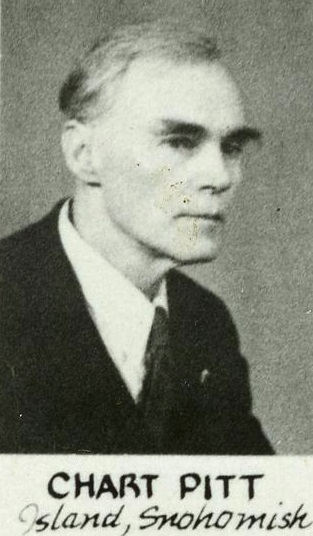
Pitt is best known today as a representative to the Washington State Legislature for the 38th District, elected in 1937, 1939, 1941, 1943 and 1945. The present 38th District includes Everett, Tulalip and Marysville (but not Mukilteo). When Pitt served, the 38th covered part of Snohomish County and part of Island County. As a legislator his antics were legendary. As the summary of “Bootlegger’s Brat” attests, Pitt long associated the “wet” interests with political corruption. Although a Democrat, he often broke with his party over this issue. During a debate in the Washington Legislature in 1939, he stood up to oppose a bill to permit sales of liquor by the drink on trains within the state. Proponents said the measure was for the benefit of thirsty tourists. “If these tourists want to souse up for 3000 miles, all right,” countered Chart Pitt, “But when they get to the state of Washington it isn’t going to hurt them a bit to sober up for a few hours.” The measure was killed by four voles.
His antics were well known to speakers of the house. When Speaker Jack Sylvester wouldn’t recognize him, Pitt waited until about halfway through the session and then leaped to his feet. “Mr. Speaker, I want to make a motion,” said Pitt. The speaker sighed and said, “Make your motion, Mr. Pitt.” Chart smiled, raised his hand and thumbed his nose at the Speaker.
During his time in the legislature, Chart Pitt took up the cause of imprisoned Communist Party political leader Earl Russell Browder, joining over 100 activists, politicians and intellectuals in the 1942 in the Free Browder Congress.
A 1945 newspaper article described him as a “grim, pipe-biting little representative” when he spoke on the house floor to oppose Governor Wallgren’s proposal to appoint a liquor control board to serve “at his pleasure.” After his side was defeated, Pitt stood up to declare he was unashamed of his vote. When told to sit down, he protested, “there is nothing before the house.” “Nothing except Pitt,” snickered another representative.
A few days later, perhaps figuring he had already committed political suicide and had nothing to lose, Chart Pitt was waving and thumping a baseball bat on boxes and desks to get the chairman’s attention during a near riot on the house floor, when labor members were beaten down in an attempt to amend the rules to permit forcing of bills from the rules committee upon presentation of a petition by 33 members or 50 members. Chart Pitt came in third in the 1946 primary election.
Although he ran for his old seat several times, he was not elected to statewide office again. His name was on the ballot as a candidate for Mayor of Mukilteo in 1947. He ran as a Progressive in the 1948 election, and was back among the Democrats in 1962.
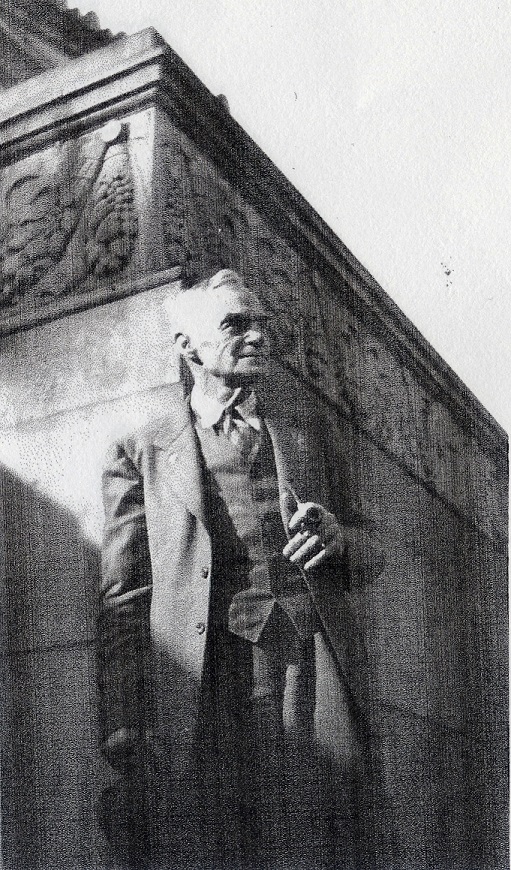
He summed up his creed as a writer, and incidentally as a legislator, when as a young man he wrote: “my literary creed is not elaborate—but it is strict. I never write anything, whether verse or fiction, unless I think it will make some poor human better because of the reading.”
Chart Pitt died Thursday, February 3, 1966, and is buried in Evergreen Cemetery in Everett, Block 50, Lot 129.
Chart Pitt’s Obituary from the Everett Herald, February 5, 1966 Chart A. Pitt Chart A. Pitt, 87, of 2510 Victor Place, died in a local hospital Thursday evening following an extended illness. Mr. Pitt was born in Wisconsin on April 17, 1878, and had lived in Mukilteo and Everett for 48 years. He was a lighthouse keeper, retiring 40 years ago. Since his retirement he has been an author. Mr. Pitt was a member of the Bellingham Bay Masonic Lodge, F. & A. M., the Townsend Club and the Golden Hour Club. He served in the Washington State Legislature for a number of years. Surviving are a daughter, Mrs. Joe Pasternack of 612 Park, Mukilteo; two sons, Donald Pitt of Forks and Gordon Pitt of Novato, California; a brother, Ray Pitt of Ketchikan, Alaska; 17 grandchildren and five great-grandchildren. Funeral services will be Monday afternoon at 3 o’clock at the funeral home of Purdy and Walters. The Rev. Philip A. Laurie of Mukilteo Presbyterian Church will officiate. Burial will be in Evergreen Cemetery. Should friends desire, memorials may be made to the charity of their choice. Pallbearers are to be Martin Roken, Rex Tucker, Oliver Markham, Miles Rooney, Robert Hayes and Andy Arvidson.
Originally published in the 1/30/2019 issue of the Mukilteo Beacon.
References:
“Chart Pitt, the Poet,” Stevens Point (WI) Gazette, Wednesday, June 15, 1910, page 1.
“Chart Pitt: His Autobiography,” Chicago Ledger, 20 Sep 1919 (vol 47 no 38) p 2, 26.
“Both Houses Pass Bulky Highway Bill after Long Battle,” Spokane Chronicle, Monday, March 12, 1945, page 2.
“It Would Be a Change! “ Pottstown, PA Mercury, 18 Feb 1939, p. 3 (regarding the debate in the Washington State Legislature over serving liquor on trains by the drink).
“North Pacific Union Gleaner,” (a Seventh-Day Adventist publication) vol. 54, no. 20, College Place, WA, dated May 18, 1959, p. 5: “May 2 was a happy day for the believers in the Everett-Marysville area when twenty precious souls were added to this faith…Mr. Chart Pitt, formerly of the State Legislature, was also baptized. A patient of Doctor Wagner, he owes some of his first contacts with the church to this Christian physician.”
History of Whatcom County, vol. 2, by Lottie Roeder Roth, 1926, pp. 473-474.
“House History Hysterical: Official Collects Stories,” by Eldon Barrett, Spokane Chronicle, Wednesday,
March 3, 1965, page 6.
Personal interview with David Dilgard, Everett Public Library, 22 Dec 2015. Having brought up the Necronomicon of H. P. Lovecraft, Dilgard mused that Lovecraft and Pitt, being both pulp authors, had a lot in common. If only Lovecraft could have been a lighthouse keeper like Pitt, he would have been happy, Dilgard said. I thought at once of Ray Bradbury’s story “The Fog Horn,” in which a great undersea beast attacks a lighthouse, and pictured to myself a Cthulhu-spawn on the spit at Mukilteo.
Personal interview with Tude Richter, Mukilteo, 12 Dec 2015.
Obituary of Lotus Jean Pitt Pasternak, Juneau Empire, May 7, 2007: http://juneauempire.com/stories/050907/obi_20070509022.shtml#.Vj6y-29dFhF
“Pioneer of the Year Elaine Scheib Jensen”, Mukilteo Beacon, 17 August 1911, p. 12.
“Wallgren Wins in Liquor Fight,” Spokane Statesman-Review, Thursday, March 8, 1945, page 1.
